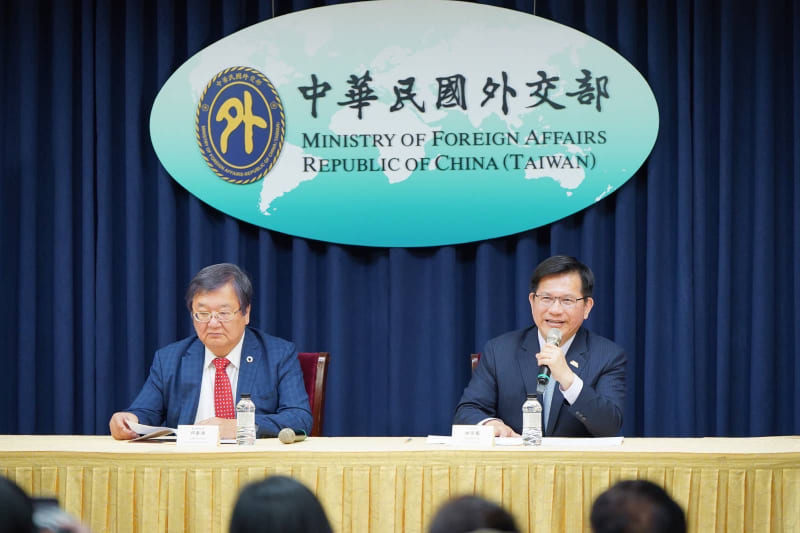Taiwan’s WHA delegation arrives in Geneva

Foreign Minister Lin (right) and Health Minister Chiu (left) speak on growing international support for Taiwan’s participation in WHO and the WHA as they call on WHO to facilitate Taiwan’s participation
During a joint press conference on May 16, Minister of Foreign Affairs Lin Chia-lung and Minister of Health and Welfare Chiu Tai-yuan called on the World Health Organization (WHO) to facilitate Taiwan’s participation. They said that Taiwan would demonstrate self-confidence and work with the world while showcasing the professionalism of Taiwan’s medical diplomacy team.
The 78th World Health Assembly (WHA) is set to open in Geneva on May 19. Minister Lin and Minister Chiu held a joint press conference at the Ministry of Foreign Affairs (MOFA) on the morning of May 16, at which they underscored Taiwan’s willingness to contribute to better global health. The two ministers said that the WHO should not brook political interference but rather should promptly invite Taiwan to participate as an observer in the WHA as well as WHO technical meetings and thus realize WHO’s goal of “One World for Health.”
Making a special appearance at the press conference was the Puzangalan Children’s Choir of Pingtung County, which performed “Ualjaiyui,” a traditional song of blessing of the Paiwan indigenous community. The song speaks of good fortune and of passing on traditions. Taiwan shares such sentiments for its WHA Action Team headed to Geneva as well as to the world at large. Minister Lin pointed out that the choir would also be traveling to Geneva to show that Taiwan was not just a land of technology but also home to cultural soft power.
Minister Lin shared that this year’s WHA slogan is “One World for Health” and that the government was calling on WHO to “Chip in with Taiwan” so that no nation or people would be left behind, allowing Taiwan to work with other nations toward a healthier world. Adding that health and disease knew no borders, he said that in addressing COVID-19 Taiwan showed great resilience and was able to assist other nations. Excluding Taiwan from the WHA and WHO therefore represented a loss for the international community.
Minister Lin further commented that Taiwan’s national health insurance program has enrolled 99 percent of residents and that no matter where people lived, they had access to Taiwan’s quality medical services and social security net, an accomplishment praised worldwide. Acknowledging WHO’s Global Action Plan for Health of Indigenous Peoples, the minister said that Taiwan was ready to share its experience providing quality medical care to indigenous people.
In the AI era, Minister Lin stated, utilizing digital technology could improve access to medical care. Reflecting this, MOFA would for the first time hold a forum on smart medicine in Geneva, at which both Acer Medical and Quanta Computer would share their experience in order to promote a Taiwan model of smart medicine. Taiwan, he said, would continue to show how it could help and underscore its role as a global leader in semiconductors and related technology.

Foreign Minister Lin (third right) and Health Minister Chiu (third left) show off t-shirts to be worn by Taiwan’s WHA Action Team while posing with Ambassador-at-Large Wu Yung-tung and the Puzangalan Children’s Choir
Minister Lin said that to realize President Lai Ching-te’s vision of a healthy Taiwan, MOFA had implemented the Diplomatic Allies Prosperity Project and eight flagship projects, which included the smart medicine and healthcare industries. He said thats MOFA had worked with the Ministry of Health and Welfare (MOHW) to establish a Taiwan medical diplomacy team as well as a medical consultation team that included professionals from medical firms and organizations. Through the “One Country, One Center” project, medical cooperation would be strengthened with New Southbound Policy partner countries. Such efforts would also bring Taiwan’s healthcare industry—comprising its biotech, pharmaceutical, and information technology sectors—to the world.
Minister Lin thanked the nation’s diplomatic allies for making proposals in favor of Taiwan’s participation, as well as like-minded countries for taking such concrete steps as sending letters and conducting joint demarches in support of Taiwan. Such actions underscored the strength of international support for Taiwan. However, China’s distortion of UN General Assembly Resolution 2758 and its pressure on the WHO Secretariat meant that Taiwan had yet to be invited to attend the WHA.
Minister Lin stressed that Taiwan had established a government firmly rooted in popular support by conducting many democratic elections. As such, only the popularly elected government of Taiwan could represent the people of Taiwan at the United Nations, WHO, and other multilateral organizations. Many nations’ executive and legislative branches had publicly stated that UNGA Resolution 2758 did not preclude Taiwan’s participation in international organizations such as WHO. He then expressed hope that more nations would work together in support of Taiwan’s participation in WHO and oppose China’s international efforts at lawfare and cognitive warfare.
In addition, Minister Lin said that this year’s WHA slogan was “One World for Health” and that a Pandemic Agreement would be signed during the meeting. Taiwan had, he said, already shown the humanitarian spirit of “Taiwan can help” during COVID-19 and proved itself a valuable resource to WHO. However, Taiwan’s absence left a gap in the global public health and disease prevention network, said Minister Lin, who called on the WHO Secretariat to not brook political interference, to maintain professionalism and neutrality, and to facilitate Taiwan’s membership in the global public health and disease prevention network so as to create greater welfare for the world.
In closing, Minister Lin said that Taiwan’s WHA Action Team would conduct publicity efforts in Geneva starting from May 16 and that MOFA and the MOHW would work together with self-confidence and engage the world. Moreover, the ministries would be proactive in making Taiwan’s voice heard and ensure that Taiwan responded to “One World for Health” and appealed to others to “Chip in with Taiwan” by making greater contributions to global public health. (E)
